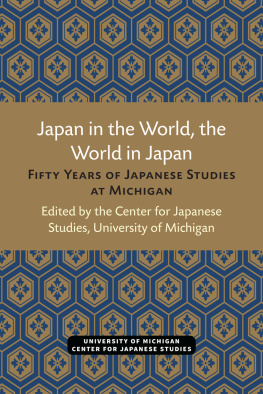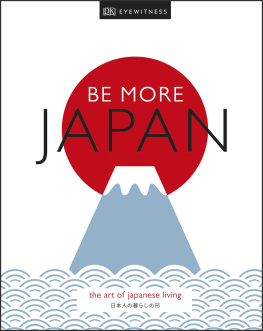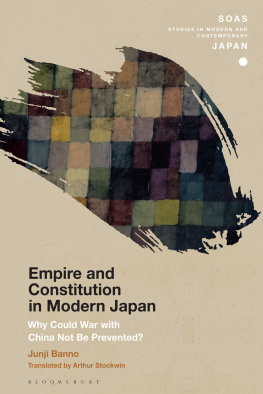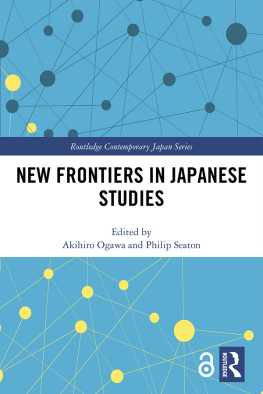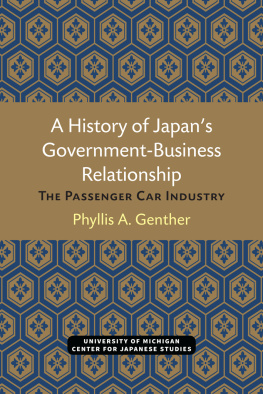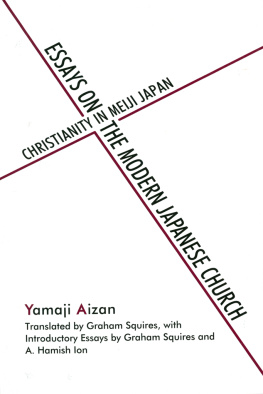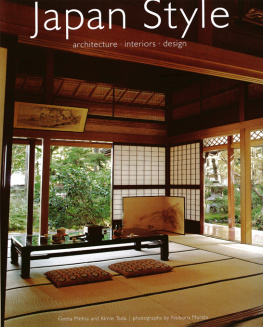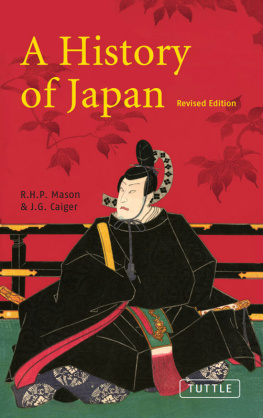Center for Japanese Studies - Japan in the World, the World in Japan: Fifty Years of Japanese Studies at Michigan
Here you can read online Center for Japanese Studies - Japan in the World, the World in Japan: Fifty Years of Japanese Studies at Michigan full text of the book (entire story) in english for free. Download pdf and epub, get meaning, cover and reviews about this ebook. year: 2001, publisher: University of Michigan Center for Japanese Studies, genre: Politics. Description of the work, (preface) as well as reviews are available. Best literature library LitArk.com created for fans of good reading and offers a wide selection of genres:
Romance novel
Science fiction
Adventure
Detective
Science
History
Home and family
Prose
Art
Politics
Computer
Non-fiction
Religion
Business
Children
Humor
Choose a favorite category and find really read worthwhile books. Enjoy immersion in the world of imagination, feel the emotions of the characters or learn something new for yourself, make an fascinating discovery.
- Book:Japan in the World, the World in Japan: Fifty Years of Japanese Studies at Michigan
- Author:
- Publisher:University of Michigan Center for Japanese Studies
- Genre:
- Year:2001
- Rating:5 / 5
- Favourites:Add to favourites
- Your mark:
- 100
- 1
- 2
- 3
- 4
- 5
Japan in the World, the World in Japan: Fifty Years of Japanese Studies at Michigan: summary, description and annotation
We offer to read an annotation, description, summary or preface (depends on what the author of the book "Japan in the World, the World in Japan: Fifty Years of Japanese Studies at Michigan" wrote himself). If you haven't found the necessary information about the book — write in the comments, we will try to find it.
Japan in the World, the World in Japan: Fifty Years of Japanese Studies at Michigan — read online for free the complete book (whole text) full work
Below is the text of the book, divided by pages. System saving the place of the last page read, allows you to conveniently read the book "Japan in the World, the World in Japan: Fifty Years of Japanese Studies at Michigan" online for free, without having to search again every time where you left off. Put a bookmark, and you can go to the page where you finished reading at any time.
Font size:
Interval:
Bookmark:

Japan in the World, the World in Japan
Fifty Years of Japanese Studies at Michigan
Edited by the Center for Japanese Studies, The University of Michigan
The Center for Japanese Studies
The University of Michigan
Ann Arbor, 2001
Open access edition funded by the National Endowment for the Humanities/Andrew W. Mellon Foundation Humanities Open Book Program.
2001 The Regents of the University of Michigan
Published by the Center for Japanese Studies, The University of Michigan, 202 S. Thayer St., Ann Arbor, MI 48104-1608
Library of Congress Cataloging in Publication Data
Japan in the world, the world in Japan : fifty years of Japanese studies at Michigan / edited by the Center for Japanese Studies, the University of Michigan.
p. cm.
ISBN 0-939512-95-5 (pbk. : alk. paper)
1. JapanStudy and teaching (Higher)United States. 2. University of Michigan. Center for Japanese StudiesHistory. I. University of Michigan. Center for Japanese Studies.
DS834.95.J318 2001
952.0071173dc21
00-064354
Cover design by Seiko Semones
This book was set in Garamond.
This publication meets the ANSI/NISO Standards for Permanence of Paper for Publications and Documents in Libraries and Archives
(Z39.48-1992).
Published in the United States of America
ISBN 978-0-939512-95-9 (paper)
ISBN 978-0-472-12796-2 (ebook)
ISBN 978-0-472-90192-0 (open access)
The text of this book is licensed under a Creative Commons Attribution-NonCommercial-NoDerivatives 4.0 International License: https://creativecommons.org/licenses/by-nc-nd/4.0/
Contents
Hitomi Tonomura
Philip H. Power
Roger F. Hackett
George Oakley Totten III
Edwin Neville
Forrest R. Pitts
Grant K. Goodman
Arthur E. Klauser
John Creighton Campbell
Robert E. Ward
J. Douglas Eyre
Grace Beardsley
Robert J. Smith
Margaret Norbeck
Robin Hall for John Whitney Hall
Beate Sirota Gordon
Hugh Patrick
Jennifer Corbett
Gary Saxonhouse
Yuzuru Takeshita
B. J. George, Jr.
Dan Fenno Henderson
Whitmore Gray
Mark Ramseyer
Merit E. Janow
Jill Kleinberg
John Shook
Kondo Motohiro
Irwin Scheiner
Bernard Silberman
Peter Duus
Edward Seidensticker
Samuel Hideo Yamashita
Richard J. Smethurst
Michael Robinson
Jung-Suk Youn
Patricia G. Steinhoff
It is the style of the Center to put Japanese personal names in Japanese order (surname first, personal name last), and we have tried to follow that style here. In a few articles, however, we have used the Western style in order to avoid, for example, Ono Eijiro next to Yoko Ono. We hope that our decision does not create too much confusion.
A crisp blue autumn sky greeted us on the morning of November 6, 1997. The night before, guests began arriving in Ann Arbor, and some walked over to Zanzibar on State Street for, along with an evening snack, warm handshakes or hugs with their old buddies and new acquaintances. Almost everyone had experienced a life at Michigan, though at different stages in the life of the Center for Japanese Studies. All had played a notable role in the development of studies about Japan into Japanese studies, an important academic field and a subject of serious human interest.
The Center for Japanese Studies had been preparing for its 50th celebration for about two years. After deciding on the theme, Japan in the World, the World in Japan, one of the earliest tasks involved compiling a list of alumni/ae. This was easier said than done; the data were far from complete. Eventually we streamlined our search into basically three different phases in the history of CJS. The first phase actually belonged to the prehistory of CJS: the time of the Army Intensive Language School, the government-run and supposedly top secret institute that produced superb linguists under strict instruction. The decade following the formal establishment of CJS in 1947, the second phase, included the Okayama outpost years of the 1950s when path-breaking, highly interdisciplinary research was accomplished. The more recent past was the third phase that saw Michigans program expand in all directions to host a large and influential body of faculty and graduate students. We also looked into resources at the Law School, whose relationship with Japanese legal scholars dates back to the late nineteenth century, and the Business School, with which CJS had worked closely on various programs including the studies related to Japans manufacturing sectors.
In identifying and locating possible speakers, we received valuable suggestions from alumni/ae themselves, many of whom, apparently, maintain their networks of past UM friends and colleagues. Slowly the outline of the event emerged. Musical performances, keynote speeches, and a historical exhibit would be important components of the celebration. The central feature was the symposium organized under three themes: Pioneering Japanese Studies, Connecting with the Professional World, and Looking Ahead to a New Global Age. Soon, the program was set; invitations were sent; venues were reserved; the food and flowers were ordered; staff assignments were clarified. We were ready to go.
The encouraging remarks from Mr. Philip H. Power, a regent of the University of Michigan, had the event rolling bright and early on November 6. The presentations from the pioneers proceeded, impressing the audience with the fascinating saga of learning the Japanese language and culture during and shortly after the war. Together with the afternoon session that vividly retold the life in Okayama, the panels of the day stimulated us to contemplate the changing significance of US-Japan relations. While the war with Japan barred Japanese-Americans from enrolling in the University, select Americans, numbering more than a thousand(!), were busy practicing Chinese characters and repeating Japanese phrases under the disciplined training demanded by the indomitable Joseph K.Yamagiwa, a Japanese-American himself. These linguists became truly outstanding by any standard, and a large number of these experts continued to hold clout in the politics of postwar years. The audience, myself included, learned a great deal about the circumstances and personalities that made the establishment of CJS possible. The prior foundation of linguistic strength and the tremendous foresight that characterized the CJS leadership were crucial in instituting an interdisciplinary program that demanded rigorous grounding in and balanced interpretations of multidimensions of Japanese society. This comprehensive approach would soon find its way to the publication of such books as Twelve Doors to Japan and Village Japan.
The participants of the celebration enjoyed an opportunity to juxtapose the speakers presentations with footings of visual images. Three documentary filmsReunion: A Streetcar to Hibiya, A Japanese Village: Modernization and Its Price, and An Island Without a Sea: Takashima and Its Half-A-Centurywere shown at breaks. In the midst of one, a misfired fire alarm in our building alerted us to roll out to the front lawn, without coats or even a cup of coffee. This perhaps was a test of our participants character and endurance. Fortunately, all seemed to survive the mini-ordeal in good humor, and I was most greateful to everyones magnanimity as well as to the sympathetic autumn weather.
Mrs. Beate Sirota Gordon, the keynote speaker that evening, was as entertaining, gracious, and captivating as her reputation suggests. There is, of course, nothing like her story of helping to write, as a young lady just in her early twenties, the constitution of a country that had only recently lost a war to hers. The Bentley Library, the site of this reception, exhibited a sampling of photos and documents from the CJSs founding days and Okayama outpost experiences. Reactions to the exhibit were mostly, Not enough! Indeed, the exhibit could have filled all of the walls of the library.
Font size:
Interval:
Bookmark:
Similar books «Japan in the World, the World in Japan: Fifty Years of Japanese Studies at Michigan»
Look at similar books to Japan in the World, the World in Japan: Fifty Years of Japanese Studies at Michigan. We have selected literature similar in name and meaning in the hope of providing readers with more options to find new, interesting, not yet read works.
Discussion, reviews of the book Japan in the World, the World in Japan: Fifty Years of Japanese Studies at Michigan and just readers' own opinions. Leave your comments, write what you think about the work, its meaning or the main characters. Specify what exactly you liked and what you didn't like, and why you think so.

